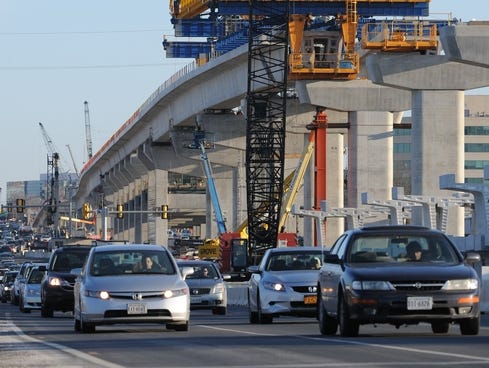We retired Tax Justice Blog in April 2017. For new content on issues related to tax justice, go to www.justtaxesblog.org
 New Hampshire’s gas tax will be increasing for the first time in nearly 23 years under a bill that will soon be signed into law by Gov. Maggie Hassan. This increase comes on the heels of gas tax increases or reforms enacted in six states and the District of Columbia last year.
New Hampshire’s gas tax will be increasing for the first time in nearly 23 years under a bill that will soon be signed into law by Gov. Maggie Hassan. This increase comes on the heels of gas tax increases or reforms enacted in six states and the District of Columbia last year.
The 4.2 cent increase won’t be enough to offset the loss in purchasing power that the state’s 18 cent tax has seen over these last two decades, but it will help generate some long-overdue revenue for transportation infrastructure. Unfortunately, New Hampshire lawmakers chose not to allow the tax rate to rise alongside inflation in future years, as is the case in 18 states today. But proposals for this kind of reform are still alive this year in at least three states:
Delaware: Governor Jack Markell continues to make the case for raising his state’s gas tax by 10 cents and linking the tax rate to inflation in future years. The plan has received a lukewarm reception in the legislature where lawmakers are up for reelection this year, but Markell is right when he describes the basic problem with not adjusting the tax for inflation: “It’s not political. It’s not philosophical. It’s math.”
Iowa: It seems that a gas tax increase is always just out of reach in the Hawkeye State, but some lawmakers were recently encouraged to hear that Governor Terry Branstad thinks reforming the tax so that it grows alongside gas prices is a good idea. While a gas tax increase or reform in Iowa is unlikely this year, it’s not impossible.
Michigan: The Republican majority in Michigan’s House recently unveiled a plan that would increase the state’s diesel tax and allow for future gas and diesel tax increases tied to the price of fuel. The plan’s proposal to redirect millions in revenue away from the general fund and toward roads and bridges is troubling, but the fact that Michigan has an all-year legislative session means that lawmakers have plenty of time to work out these kinds of problems before voting on gas tax reform.